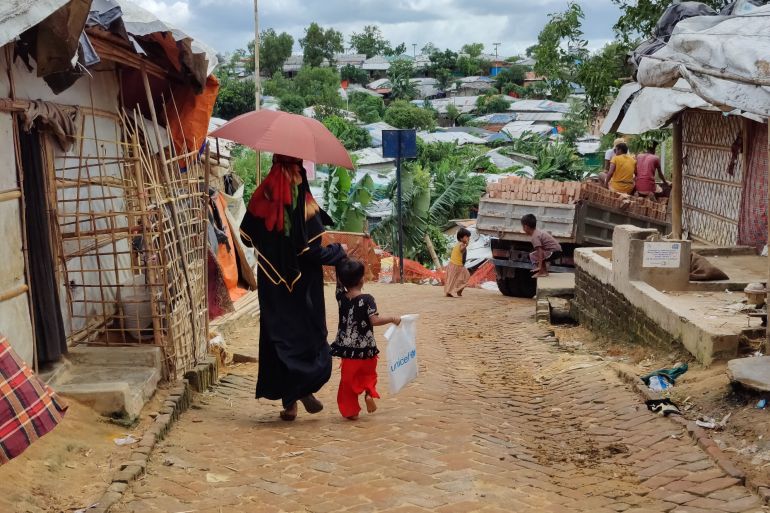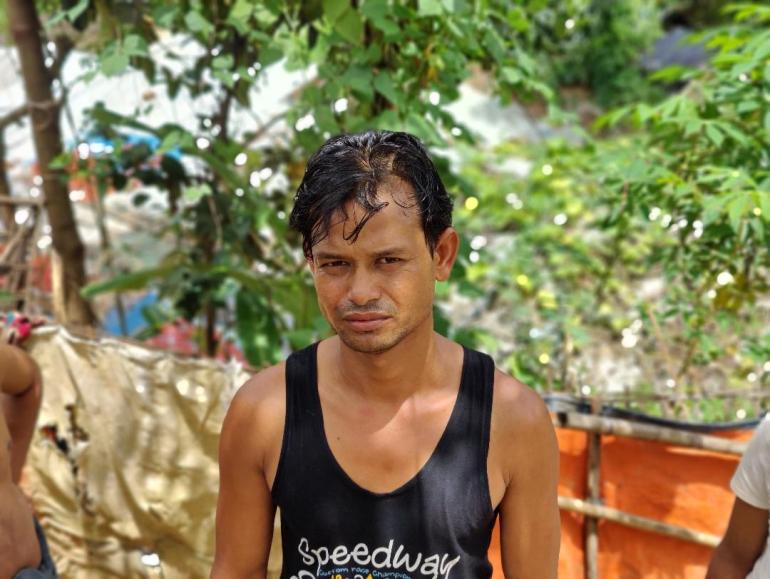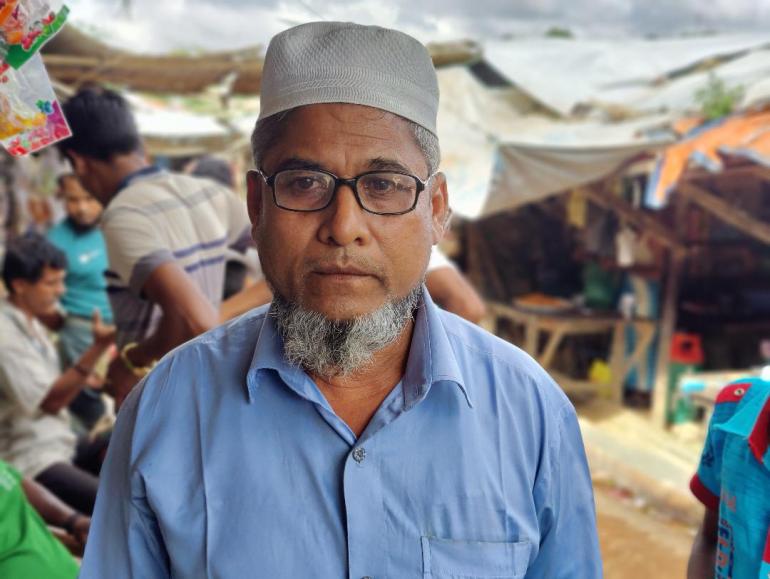Six years of Rohingya exodus: Food crisis and fears of a ‘lost generation’
Refugees observe August 25 as ‘Genocide Day’ to demand justice and safe and voluntary repatriation to their homes in Myanmar.

Dhaka, Bangladesh – Mohammad Jalil still has nightmares recounting the harrowing journey he took last October on a rickety boat in the Bay of Bengal.
Jalil, a 26-year-old Rohingya refugee from Bangladesh’s Kutupalong camp, paid around $1,500 to an agent who promised him a safe journey to Malaysia.
Keep reading
list of 4 itemsRohingya in Bangladesh protest to be sent home after UN aid cut
Rohingya refugees fled Myanmar only to ‘live in fear’ in India
Rohingya youth long for a future beyond the barbed wire
A month later, he found himself on board an overcrowded fishing trawler drifting aimlessly on a fierce sea for about a week.
“We had no food and the children were crying in hunger. The people who were in charge of the trawler beat us mercilessly. On the ninth or 10th day – I can’t remember – the boat sank,” Jalil told Al Jazeera.
He, along with a few others, swam for hours before being rescued by the Bangladeshi coastguard.
“Some women and children couldn’t make it and drowned,” he said. “All my money is gone. I have lost everything.”

Jalil, however, is lucky to be alive.
The United Nations says 2022 was one of the deadliest years for the Rohingya at sea after nearly 400 refugees perished while making treacherous boat trips from Myanmar and Bangladesh across the Andaman Sea and the Bay of Bengal.
Jalil’s close shave with death and his desperation to flee Bangladesh underscores the plight of nearly a million Rohingya, most of whom fled their native Myanmar on August 25, 2017 after its military launched what the UN described as a campaign with “genocidal intent” against the mostly-Muslim minority.
As the Myanmar military began to kill Rohingya men, rape women and burn their villages that day, more than 750,000 of them fled to neighbouring Bangladesh where they were sheltered in the southern Cox’s Bazar district – now the world’s largest refugee camp.
Since then, the refugees observe August 25 as “Genocide Day” to demand justice and seek safe and voluntary repatriation to their homes in Myanmar, which is facing a genocide trial at the International Court of Justice at The Hague.
‘Caged bird’
The risky sea ventures to Malaysia and other Southeast Asian nations are just one of many reminders that the Rohingya refugees in Bangladesh lead a precarious existence, losing hope of safely returning to their now military-ruled homeland and being shunned by the rest of the world.
Jalil thought he could start a new life in Bangladesh when he arrived in 2017. But in the last six years, he says he has found himself in a tight corner with no work and no way of moving outside the barbed wires of the refugee camps.
“I felt like a caged bird. I learnt that those who had made it to Malaysia were earning well. That’s why I risked all my savings. Now I am back to square one,” he told Al Jazeera.
Journalist Kaamil Ahmed interviewed hundreds of such refugees for his book, I Feel No Peace, and found that they have almost lost hope of returning safely to Myanmar.
“They also believe they can’t live dignified lives in the refugee camps,” Ahmed told Al Jazeera. “These refugees are utterly stateless and marginalised wherever they are.”
In December 2021, Bangladesh shut down all the refugee-run schools in which Rohingya children were being taught the Myanmar curriculum up to Grade 10. Nur Kabir, who ran the largest of these schools, told Al Jazeera his students are now passing their days doing nothing.
“What will they become when they grow up? Why can’t our children deserve better?” the 28-year-old teacher asked.
Shamsud Douza, the Additional Refugee, Relief and Repatriation Commissioner, told Al Jazeera the refugee-run schools taught in Bangla language, which the Bangladesh government prohibits in order “to keep Rohingya from integrating and remaining permanently in the country”.
“We want their [Rohingya] safe and voluntary return to their homeland,” Douza said. But he also admitted that several repatriation attempts have failed and prospects of a safe repatriation in the near future are “very dim”.
Abdur Rahim, a Rohingya community leader, told Al Jazeera they are not living a “dignified life” in the camps. “We still long for our homelands but we fear the situation there is not at all suitable for our return.”

Meanwhile, the patience of the host community is thinning. A 2019 survey conducted by the UNDP revealed that two-thirds of the residents of Cox’s Bazar believe they are suffering due to the Rohingya influx.
“Four years later, things have gotten even worse,” Saikat Rafi, an NGO worker posted in Cox’s Bazar, told Al Jazeera.
Rafi, who works with both the refugees and the host community, said the latter has become more hostile as they feel the Rohingya are “getting foreign donations” and yet “stealing their jobs”.
Matlub Ali, a construction worker at Cox’s Bazar, alleged the refugees have cut barbed wires at nearly 150 places in the sprawling camps and sneak out to offer their labour at half the price. “We can’t get jobs because of them,” he told Al Jazeera.
Half a million children at risk: Charity
The Rohingya refugees in Bangladesh camps rely almost entirely on food aid as they are not allowed to leave the camps or formally work. Since March this year, the World Food Programme assistance to a million refugees was cut by a third to just $8 per month due to a funding shortfall.
As a result, the health and well-being of more than half a million children are at risk due to recent drastic cuts in food assistance, Save the Children charity said in a statement on Thursday.
“Even before the first food ration cuts, 45 percent of Rohingya families were not eating a sufficient diet and malnutrition was widespread in the camps, with 40 percent of children experiencing stunted growth,” the charity said.
“The humanitarian response is at breaking point,” it said, adding that the children are “in danger of becoming a lost generation”.
“They cannot remain stateless and unprotected, living their lives in isolated limbo. The international community should demonstrate it has not turned its back on them – and to properly fund the humanitarian programmes in the camps,” it added.
The Bangladesh government, however, says hosting the refugees is putting a strain on its economy. Prime Minister Sheikh Hasina last year said the cost of running the camps is more than $1.2bn annually and only 48 percent of the pledged $881m assistance from the UN was met.
Regina de la Portilla, the UNHCR spokesperson in Bangladesh, told Al Jazeera the reduction in funding will have “a direct impact on people already living with minimum services”.
‘Permanent fixture within Bangladeshi territory’
In a statement earlier this week, the Human Rights Watch said the UN and concerned governments should continue to underscore that conditions for the safe, sustainable and dignified return of Rohingya to Myanmar do not currently exist.
The rights group added that the UN Security Council’s “inaction and government aid cutbacks are leaving Rohingya in even more desperate straits”.
“Rohingya on both sides of the Myanmar-Bangladesh border are trapped in stateless purgatory, denied their most basic rights, awaiting justice and the chance to go home,” said Shayna Bauchner, Asia researcher at Human Rights Watch.
“Moving ahead with repatriating Rohingya now would mean sending refugees back to the control of a ruthless and repressive junta, setting the stage for the next devastating exodus,” Bauchner said.
“Building conditions for the voluntary, safe, and dignified return of Rohingya will need a coordinated international response to establish rights-respecting civilian rule in Myanmar and achieve justice for past atrocities.”
Dr Delwar Hossain, director of East Asia Study Center at Dhaka University, told Al Jazeera the world’s attention has already moved from the Rohingya refugees and they possibly have become a “permanent fixture within the Bangladeshi territory”.
Hossain said the resurgence of violence in Myanmar’s Rakhine state – where most Rohingya lived before 2017 exodus – has opened a dangerous fissure in Southeast Asia that threatens to divide the two most important religious faiths in the region: Buddhism and Islam.
“Faiths that have lived peacefully in this region for millennia have never had such high tensions. If it persists, it could pose a greater threat to the social stability of the whole region,” he said.